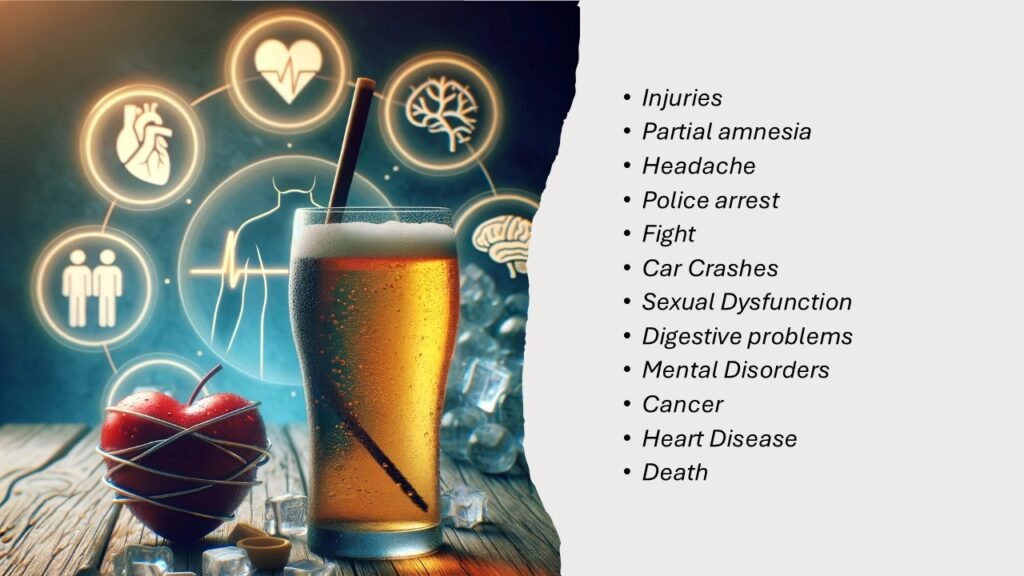Introduction
The benefits of quitting alcohol are immense and can positively impact millions of lives. Did you know that, according to the World Health Organization (WHO), alcohol is linked to over 3 million deaths each year? That’s about 5% of all deaths globally! It doesn’t just lead to liver disease; it’s also a big contributor to cancers, heart problems, and even accidents like car crashes and falls. Alcohol-related injuries are common causes of hospital visits.
Some regions, like Europe and the Americas, see higher alcohol use, but the problem is growing in many other parts of the world too. Both men and women are affected, but men tend to drink more heavily. Tackling the issue of alcohol use is crucial for improving health and saving lives, especially as the impacts are felt across societies. We will discuss 12 benefits of quitting alcohol.
Click Here to Know “How To Quit Alcohol: Coping Strategies”

1. Avoid Accidents – One of The Major Benefits of Quitting Alcohol
Alcohol can lead to many serious accidents and injuries. It is involved in at least half of all severe injuries and deaths from things like burns, drownings, and violent acts. Alcohol also plays a role in four out of ten deadly falls, car crashes, and suicides. You don’t have to stop drinking completely to be safer. Even cutting down by just one or two drinks can lower your chances of getting hurt or sick. For example, if you usually drink three beers a day, reducing it to one or two can make a big difference in your safety.
2. Your Heart Gets Healthier: The Cardiovascular Benefit of Quitting Alcohol
You might have heard that a glass of red wine or another alcoholic drink can be good for your heart. But this is usually only true if you drink very little, like less than one drink a day. Drinking more than that can raise your blood pressure and the amount of fat in your blood, which can harm your heart. Cutting back on alcohol or stopping altogether can help lower these risks. For instance, studies show that drinking less can reduce your blood pressure and make your heart healthier.
3. Your Liver May Heal: One of The Key Benefits of Quitting Alcohol
Your liver has an important job: to filter out toxins and keep your body clean. But alcohol is very hard on your liver. Drinking a lot—like 15 or more drinks a week for men and eight or more for women—can cause serious damage, like liver disease. The good news is that the liver can heal itself if you stop drinking or drink less. Even taking a break from alcohol for just a month can help your liver start to recover and get healthier.
4. You Might Lose Weight: Another Significant Benefit of Quitting Alcohol
Alcoholic drinks have a lot of calories. For example, a regular glass of beer has about 150 calories, and a glass of wine has around 120 calories. These are often called “empty calories” because they don’t give your body any nutrients. Alcohol can also make you feel hungrier and more likely to eat unhealthy foods, like chips or sweets. By drinking less, you might find it easier to make better food choices and lose weight. Research shows that people who cut back on alcohol often see a drop in their weight and belly fat.
Click Here to Know About Obesity
5. Improve Your Relationships: The Social Benefits of Quitting Alcohol
Drinking alcohol in small amounts at social events can sometimes make people feel more relaxed and friendly. But drinking too much or drinking alone can become a bad habit and can hurt your relationships. If you have trouble controlling your drinking, it might lead to alcohol use disorder, which can affect your work, health, and friendships. Cutting down on alcohol or quitting can help you focus more on the people you care about and improve your mental health. Studies show that people who drink less often feel less anxious and have better relationships.
6. Lower Cancer Risks: One of the Long-Term Benefits of Quitting Alcohol
Drinking a lot of alcohol can increase your risk of several types of cancer, like those of the throat, mouth, and breast (NIH). It’s less clear if stopping drinking can lower these risks and how long it might take to see a difference. Some research suggests that the risk of cancer goes down after quitting alcohol, especially for cancers of the mouth and throat. For example, studies show that the risk of some cancers starts to decrease after 5 to 10 years of not drinking alcohol.
7. Your Sex Life Might Improve: Unexpected Benefits of Quitting Alcohol
A little alcohol can make people feel more relaxed and playful. But drinking more than one or two drinks a day can have the opposite effect. For men, too much alcohol can make it hard to get or keep an erection. For women, it can lower sexual desire and cause dryness. Cutting back on alcohol might help improve your sex life. Studies have found that people who drink less often feel more satisfied with their romantic relationships.
8. You’ll Sleep Better: One of the Immediate Benefits of Quitting Alcohol
Alcohol might make you feel sleepy at first, but it can actually mess up your sleep later. It can prevent you from reaching deep sleep stages, like REM sleep, which is important for feeling well-rested. Alcohol can also make you wake up more often during the night and need to use the bathroom more. To sleep better, try to avoid drinking alcohol, especially in the hours before bedtime. Research shows that people who drink less alcohol sleep more soundly and wake up feeling more refreshed.
9. You’ll Get Sick Less: Quitting Alcohol Boost Immunity
Even one episode of heavy drinking can weaken your immune system for up to 24 hours, making it easier for you to get sick. Over time, drinking a lot can make it harder for your body to fight off germs and heal itself. Drinking less can help strengthen your immune system, so you’re less likely to catch colds or other illnesses. Studies have found that people who reduce their alcohol intake often get sick less frequently.
10. Lower Your Blood Pressure: A Crucial Benefit of Quitting Alcohol
If you drink a lot and have high blood pressure, stopping alcohol can help bring your numbers down. Even just cutting back on how much you drink can lower your blood pressure. Normal blood pressure is below 120/80 mm Hg, and high blood pressure is more than 130/80 mm Hg. If your blood pressure is high, drinking less can make a big difference and help protect your heart.
11. Clear Your Brain: Cognitive Benefits of Quitting Alcohol
Heavy drinking can make it hard to think clearly or remember things. It can also slow down your reaction time and make it harder to understand what other people are feeling. But when you stop drinking, your brain can start to heal. People who quit alcohol often notice that their memory and thinking skills improve within a few weeks to months.
12. Manage Withdrawal Safely: Understanding the Benefits of Quitting Alcohol
If you’ve been drinking heavily, your body might react when you stop. You could have symptoms like sweating, a fast heartbeat, nausea, shaking hands, or feeling very anxious. In more severe cases, you might even have seizures or see things that aren’t there (hallucinations). It’s important to get help from a doctor if you plan to quit drinking, especially if you’ve been a heavy drinker. A doctor can give you advice and might prescribe medication to help manage withdrawal symptoms safely.
Conclusion
Reducing or quitting alcohol can lead to numerous positive changes in your life. From lowering your risk of accidents and improving your heart and liver health to boosting your mood and enhancing your sleep, the benefits are clear.
Making the choice to drink less not only supports your physical health but also strengthens your relationships and mental well-being. Whether you’re looking to lose weight, reduce your risk of serious illnesses, or simply feel better each day, cutting back on alcohol can be a powerful and rewarding step. Remember, it’s never too late to make a change for the better. Taking control of your health by reducing alcohol is a great way to improve your overall quality of life and enjoy a healthier, happier future.
